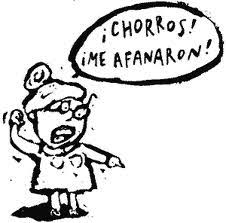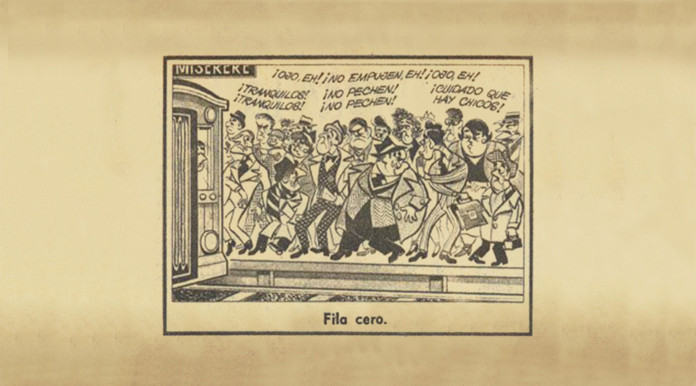LUNFARDO Y MODISMOS
One thing you will notice right away studying, working, interning, or living abroad in Buenos Aires is how differently porteños speak! Aside from the region’s linguistic particularities, such as sheísmo (y and ll pronounced as “sh”) and the use of vos as a second-person singular subject pronoun instead of tú (tenés instead of tienes), porteños (natives to Buenos Aires) also are known for their slang. While every country, region, and city has their own modisms and idioms used in colloquial speech, we at Mente Argentina are particularly fond of lunfardo.
Many people know that the best way to learn Spanish is to live in a Spanish-speaking country and experience full immersion. Studying abroad in Buenos Aires gives you the opportunity to take Spanish classes while applying what you learn in the classroom to what you hear from the locals. Here is a little history brief as well as a guide to some lunfardo that you are sure to hear while in Buenos Aires!
Lunfardo is thought to have emerged at the tail end of the 19th century during Argentina’s wave of immigration from Italy. This began around 1870 when Italians were fleeing economic instability and seeking work during the process of Italian unification. Because of this, lunfardo is in great part influenced by the Italian language, as well as gaucho and African lexicon. Lunfardo was first popularized among the lower classes – particularly around Buenos Aires, and later in Rosario and Montevideo, Uruguay. However, it later began to circulate and enter quotidian use among all social classes and even became widely used in tango lyrics.
- a full: overworked, busy, in a rush (“estoy a full con la facultad”) A lot, packed with people, (“cómo fue la fiesta?” “a full che”)

- afanar: to steal
- alcahuete: a nark, tattle-tale
- bárbaro: great, cool
- berretta: cheap or bad quality
- boludo/a: the term boludo/a can both be an insult by calling someone an idiot; a term of endearment used among friends
- boludez: a task that’s easy to do or something you don’t want to do
- boludear: to joke around (“me estás boludeando”); to waste time
- hacerse el boludo: to act like an idiot
- boliche: dance club
- bondi: bus, slang for “colectivo,” the more common term for bus
- bronca: anger, frustration
- darse bronca: used to say that something upsets you
- buena onda: cool; can refer to a person, a place, an activity, etc.
- capaz: maybe, (“capaz que sí”)
- careta: fake, from “cara” as if you have a mask on
- chabón: guy
- chamuyar: smooth talking, especially in romantic situations
- chamuyero: used most often for a guy who hits on a lot of women by talking them up
- charlatán: a show off/know-it-all, used similarly to chamuyero
- che: used as a colloquial phrase when talking to someone, often at the beginning of a sentence, (“che, ¿cómo estás?”)
- chorro: thief
- dale: like “ok”, but used in agreement, (“¿querés ir al parque?” “¡dale!”)
- estar en pedo: to be really drunk, to be in trouble (used like “I’m screwed”)
- fiaca: laziness
- forro: condom
- forro/a: used also as an insult, like idiot
- huevos: literally means eggs, used like “balls” in English
- me costó un huevo y medio: more slang way of saying something was expensive, similar to the English saying “it cost me an arm and a leg”
- joda: a party, usually with intonation of it being wild
- guita: money, used like “cash”
- laburar: to work
- lunfardo: the Argentine/rioplatense slang
- luca: one thousand pesos, 1.000 pesos = 1 luca, 2.000 pesos = 2 lucas
- mango: Money, used like “bucks” in English. 1 peso = 1 mango, 2 pesos = 2 mangos
- medio: placed before adjectives to say “kind of” or “a little”. (“a veces es medio difícil”)
- ¡mirá vos!: used commonly as “wow!” or literally “look at you!”
- mina: woman, originated as an offensive term but now used commonly
- un montón: a lot, a ton
- morfar: to eat
- morfi: food
- pelotudo: idiot
- pibe: a kid, child
- plata: money, used like “cash”
- posta: used in agreement, for emphasis, “for real”, could also be used as a question
- puede ser: could be, maybe
- pucho: a cigarette
- qué sé yo: what do I know
- quilombo: mess, much stronger expression than “lío” or “desastre”
- re-: really, very, used as a prefix to an adjective, “estoy recontento”
- subte: short for el subterráneo, which is the subway in Buenos Aires
- tal cual: exactly, used in agreement to a statement
- telo: a pay-by-the-hour motel
- tener ganas: to be in the mood to do something, “yo tengo ganas de mirar una película”
- pilas: literally means batteries but is used as energy, intention, etc.
- con pilas: with energy or excitement
- tipo: guy, dude, used not to address friends, sometimes in a negative tone; used as description or time. tipo can also be added to the end of sentences (mostly with times or numbers) to mean “around” (“¿cuando nos juntamos?” “tipo a las 8”)
- trucho: fake, especially used for something counterfeit
- vesre: one tendency of lunfardo is to reverse syllables in words, for instance telo is the reverse of hotel, just as vesre is just a vesre version or reves
- viste: literally the you-preterite of ver, or “you saw”, but is used to say “you know?”
Written by: Rachel Sherman
Updated and edited by: Rachel Orga

